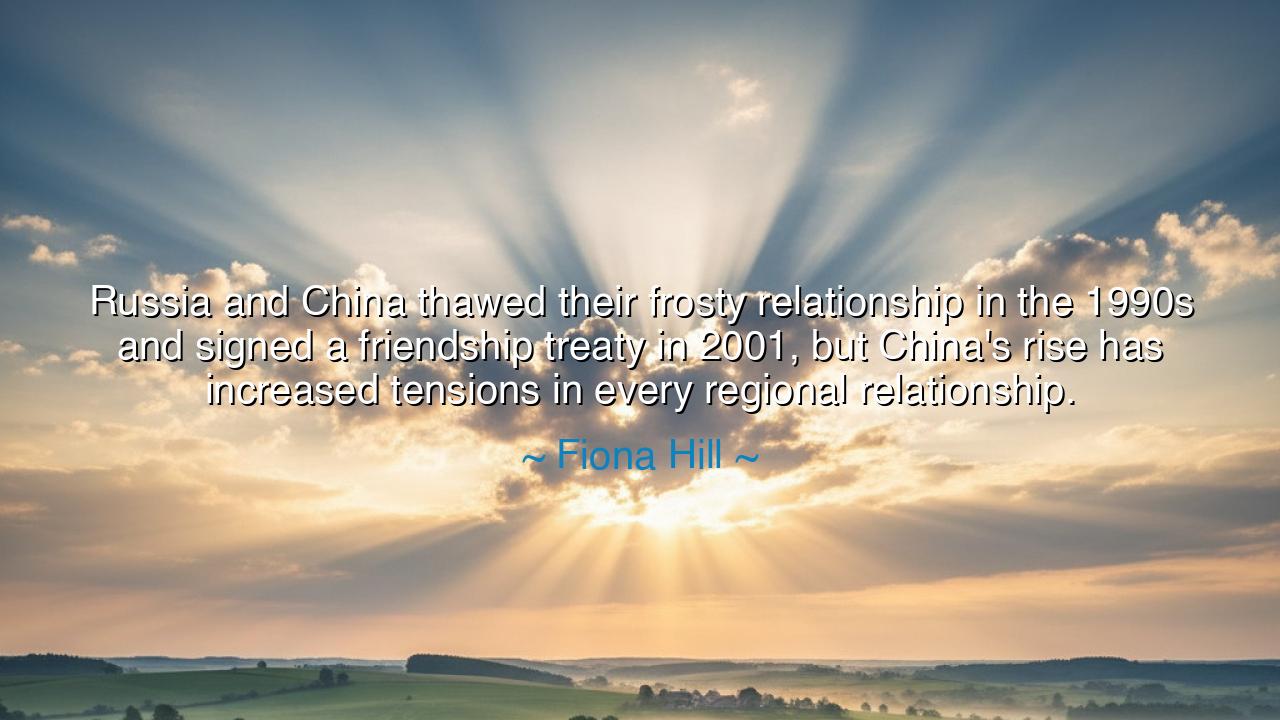
Russia and China thawed their frosty relationship in the 1990s
Russia and China thawed their frosty relationship in the 1990s and signed a friendship treaty in 2001, but China's rise has increased tensions in every regional relationship.






The political scholar and historian Fiona Hill, a voice of clarity in an age of turbulence, once observed: “Russia and China thawed their frosty relationship in the 1990s and signed a friendship treaty in 2001, but China's rise has increased tensions in every regional relationship.” In these words lies not only an analysis of geopolitics, but also a profound reflection on power, friendship, and the fragile balance between cooperation and rivalry. Beneath the surface of diplomacy and treaties, Hill unveils a truth as old as empires: that alliances born of necessity often conceal the seeds of future discord, and that when one friend rises too swiftly, equilibrium begins to tremble.
The meaning of this quote transcends the borders of nations. It is a study in the nature of human and political relationships alike. Russia and China, two ancient civilizations bound by geography and shared trials, learned to coexist after years of hostility and mistrust. Their “frosty relationship” thawed when both saw in one another a path to survival and strength. But as time passed, China’s rise—its growing economic might, its global influence—altered the balance. Friendship, once forged in equality, began to strain under the weight of disparity. This is the eternal lesson: that relationships, whether between individuals or nations, are most tested not in hardship, but in success.
The origin of Hill’s insight rests upon her lifelong study of power dynamics and history’s unchanging patterns. She witnessed, as many historians have, that cooperation among giants is seldom peaceful for long. When Russia and China stood weakened after the Cold War, they looked to each other as partners in a changing world. The Treaty of Friendship they signed in 2001 symbolized reconciliation—a promise of mutual respect, non-aggression, and shared progress. Yet, as China’s star ascended and Russia’s influence waned, the old equilibrium cracked. Just as in the ancient alliances of Greece or the shifting empires of Asia, friendship turned into quiet rivalry, concealed beneath the language of diplomacy.
History echoes this pattern with haunting familiarity. Consider the story of Rome and Carthage, two powers once bound by trade and mutual advantage. When Carthage prospered, Rome grew wary; friendship turned to suspicion, and suspicion to war. So too did Napoleon and Tsar Alexander I of Russia once share a moment of alliance before ambition divided them. Hill’s reflection reveals the same rhythm repeating itself in the modern age—proof that power without humility breeds distrust, and that friendship without balance cannot endure.
Yet her words also carry a deeper, more philosophical wisdom. The rise of one does not always have to mean the fall of another. It is pride, fear, and envy that transform growth into conflict. Whether between nations or within the human heart, the challenge is the same: to celebrate another’s strength without feeling diminished by it. The true art of diplomacy—and of life—is not merely to forge alliances, but to sustain them when tides change. Hill’s observation becomes not just a lesson in global politics, but in human nature itself: the ability to grow without outgrowing those who once stood beside us.
There is a certain tragedy in the friendship of great powers. Like titans bound by shared storms, they clasp hands in adversity but often pull apart in triumph. Russia and China’s story reminds us that friendship built on fear of outsiders, rather than faith in one another, will always be temporary. The “tensions in every regional relationship” are not born from destiny, but from the failure to rise above self-interest. When one seeks dominance instead of harmony, even the strongest treaty becomes paper in the wind.
The lesson, then, is clear and timeless. Whether we speak of nations, leaders, or individuals, friendship must be rooted not in convenience, but in mutual respect and humility. Power must never blind us to the humanity of those who stand beside us. The wise learn to balance ambition with empathy, progress with patience, and success with generosity. For as history has shown, the greatest victories are hollow when they leave one standing alone.
So let Hill’s reflection be more than political commentary—it is a mirror to our own conduct. Friendship, like peace, must be tended constantly; it cannot survive the unchecked rise of pride. Whether in the realm of nations or in the quiet chambers of the heart, remember this: true strength lies not in surpassing others, but in lifting them alongside you.






AAdministratorAdministrator
Welcome, honored guests. Please leave a comment, we will respond soon